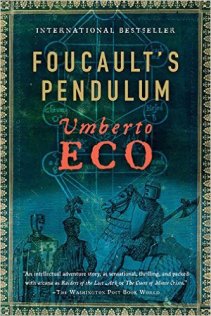I used to have no weekends. I had two days off, one weekday and one weekend day, and I loved it. There wasn’t enough time to get away from it all, I could visit almost entirely empty museums, and it was easier to come back to work after just a day. Now that I have a weekend, I both sort of enjoy having two days off to myself and hate the fact that I am once again part of the masses who resent Sunday night and don’t want to go to work on Monday.
 This week has been annoying to say the least, and now Umberto Eco died, so it is not ending on a high note either. What I would really like to do is to spend an entire day tomorrow re-reading Foucault’s Pendulum, the book with which I used to obsessed at one point in my life. Yet for some indescribable reason, I no longer have a copy, so I am going to settle for another example of strange historical fiction, John Wray’s Lost Time Accidents.
This week has been annoying to say the least, and now Umberto Eco died, so it is not ending on a high note either. What I would really like to do is to spend an entire day tomorrow re-reading Foucault’s Pendulum, the book with which I used to obsessed at one point in my life. Yet for some indescribable reason, I no longer have a copy, so I am going to settle for another example of strange historical fiction, John Wray’s Lost Time Accidents.
To continue with the historical novel theme, here’s a great interview with Alexander Chee about his new novel, The Queen of the Night, and about how historical novels are still seen as lower-class fiction. You can replace ‘historical’ with any other genre fiction descriptor and it would still apply. The interesting thing mentioned therein is that realism fiction is seen as superior, but only if it’s produced by Northern American writers (so see, Eco was not in this category and thus got a pass to write whatever the hell he wanted). Read it, it’s a very good interview. And read The Queen as well, especially if you, like me, love your novels long, vivid, and detailed.
Speaking of historical scribblings, where would one submit historical weird horror? Asking for a friend.
